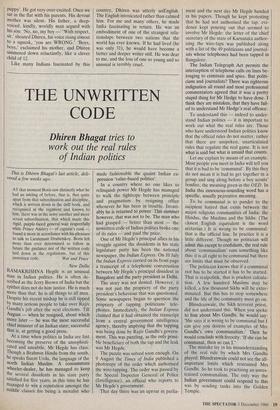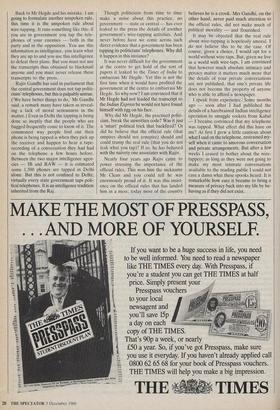THE UNWRITTEN CODE
Dhiren Bhagat tries to
work out the real rules of Indian politics
This is Dhiren Bhagat's last article, deli- vered a few weeks ago.
AT that moment Boris saw distinctly what he had an inkling of before, that is, that quite apart from that subordination and discipline, which is written down in the drill book, and recognised in the regiment and known to him, there was in the army another and more actual subordination, that which made this rigid, purple-faced general wait respectfully while Prince Andrey — of captain's rank — found it more in accordance with his pleasure to talk to Lieutenant Drubetskoy. Boris felt more than ever determined to follow in future the guidance not of the written code laid down in the regulations, but of this unwritten code. War and Peace New Delhi RAMAKRISHNA Hegde is an unusual man in Indian politics. He is often de- scribed as the Jerry Brown of India but the epithet does not do him justice. He is much more than that: he is all things to all men. Despite his recent mishap he is still tipped by many serious people to take over Rajiv Gandhi's job after the next elections. Till August — when he resigned, about which more later — he was the most successful chief minister of an Indian state; successful that is, at getting a good press.
At a time when politics in India are fast becoming the preserve of the unsophisti- cated and unsubtle, Mr Hegde has class. Though a Brahmin Hindu from the south, he speaks fluent Urdu, the language of the north Indian Muslim. A consummate wheeler-dealer, he has managed to keep the several dissidents in his state party satisfied for five years: in this time he has managed to win a reputation amongst the middle classes for being a moralist who made fashionable the quaint Indian ex- pression 'value-based politics'. In a country where no one likes to relinquish power Mr Hegde has managed to walk the tightrope between principle.
and pragmatism by resigning office whenever he has been in trouble. Invari- ably he is returned to power. This summer however, that was not to be. The man who had grasped — better than most — the unwritten code of Indian politics broke one of its rules — and paid the price.
One of Mr Hegde's principal allies in his struggle against the dissidents in his state legislature party has been the national
newspaper, the Indian Express. On 10 July the Indian Express carried on its front page a transcript of a telephonic conversation between Mr Hegde's principal dissident in Bangalore and the party president in Delhi.
The story was not denied. However, it was not just the propriety of the party president's behaviour that was questioned. Some newspapers began to question the propriety of tapping politicians' tele-
phones. Immediately, the Indian Express
claimed that it had obtained the transcript from a central government intelligence agency, thereby implying that the tapping was being done by Rajiv Gandhi's govern- ment. This was puzzling, as the only possi- ble beneficiary of both the tap and the leak was Mr Hegde.
The puzzle was solved soon enough. On 9 August the Times of India published a
photocopy of the order which authorised the wire-tapping. The order was passed by the Special Inspector General of Police (Intelligence), an official who reports to Mr Hegde's government.
That day there was an uproar in parlia-
ment and the next day Mr Hegde handed in his papers. Though he kept protesting that he had not authorised the tap, evi- dence kept pouring out that seemed to involve Mr Hegde: the letter of the chief secretary of the state of Karnataka author- ising the wire-taps was published along with a list of the 49 politicians and journal- ists whose telephones had been tapped in Bangalore.
The Indian Telegraph Act permits the interception of telephone calls on lines be- longing to criminals and spies. But politi- cians and journalists? There was righteous indignation all round and most professional commentators agreed that it was a pretty stupid thing for Mr Hedge to have done. I think they are mistaken, that they have fail- ed to understand Mr Hedge's real offence.
To understand this — indeed to under- stand Indian politics — it is important to work out what the real rules are. Those who have understood Indian politics know that the official rules do not matter, rather that there are unspoken, unarticulated rules that regulate the real game. It is not what is said but what is unsaid that counts. Let me explain by means of an example. Most people you meet in India will tell you that it is bad to be 'communal'. By this they do not mean it is bad to get together in a group and sing along before a boy scouts'
bonfire, the meaning given in the OED. In India this innocuous-sounding word has a specific, usually pejorative meaning.
To be communal is to pander to the incipient hatred that exists between the major religious communities of India: the Hindus, the Muslims and the Sikhs. (The closest English equivalent is the word sectarian.) It is wrong to be communal: that is the official line. In practice it is a little different. Though no politician will admit this except to confidants, the real rule about 'communalism' runs something like this: it is all right to be communal but there are limits that must be observed.
The politician knows that if a communal riot has to be started it has to be started.
That is realpolitik, that is prudent calcula- tion. A few hundred Muslims may be killed, a few thousand Sikhs will be exter- minated. But this has to stop somewhere and the life of the community must go on. Bhindranwale, the Sikh terrorist priest, did not understand this. When you spoke to him about Mrs Gandhi, he would say: 'She says it is wrong to be communal but I can give you dozens of examples of Mrs Gandhi's own communalism.' Then he would conclude with ferocity: 'If she can be communal, then so can I.'
The mistake lay in his misunderstanding of the real rule by which Mrs Gandhi played: Bhindranwale could not see the all- important limits which restrained Mrs Gandhi. So he took to practising an unres- trained communalism. The only way the Indian government could respond to this was by sending tanks into the Golden Temple. Back to Mr Hegde and his mistake. I am going to formulate another unspoken rule, this time it is the unspoken rule about wire-tapping. It runs something like this: if you are in government you tap the tele- phones of your enemies — both in the party and in the opposition. You use this information as intelligence, you learn what they are up to and you use this intelligence to defeat their plans. But you must not use the transcripts thus obtained to blackmail anyone and you must never release these transcripts to the press.
Rajiv Gandhi has said in parliament that the central government does not tap politi- cians' telephones, but this is palpably untrue. (`We have better things to do,' Mr Gandhi said, a remark many have taken as reveal- ing a lack of moral seriousness in the matter.) Even in Delhi the tapping is being done so ineptly that the people who are bugged frequently come to know of it. The commonest way people find out their phone is being tapped is when they pick up the receiver and happen to hear a tape- recording of a conversation they had had on the telephone a few hours before. Between the two major intelligence agen- cies — IB and RAW — it is estimated some 1,500 phones are tapped in Delhi alone. But this is not confined to Delhi; virtually every state government taps poli- tical telephones. It is an intelligence tradition inherited from the Raj. Though politicians from time to time make a noise about this practice, no government — state or central — has ever leaked to the press the details of another government's wire-tapping activities. And never before have we come across such direct evidence that a government has been tapping its politicians' telephones. Why did it happen in this instance?
It was never difficult for the government at the centre to get hold of the sort of papers it leaked to the Times of India to embarrass Mr Hegde. Yet this is not the first time when it would have profited the government at the centre to embarrass Mr Hegde. So why now? I am convinced that if Mr Hegde had not leaded the transcript to the Indian Express he would not have found himself with egg on his face.
Why did Mr Hegde, the practised politi- cian, break the unwritten code? Was it just a 'smart' political trick that backfired? Or did he believe that the official rule (that umpires should not conspire) should and could trump the real rule (that you do not leak what you tap)? If so, he has behaved with the naivety one associates with Rajiv.
Nearly four years ago Rajiv came to power stressing the importance of the official rules. This won him the nickname Mr Clean and you could tell •he was enormously proud of it. It was this insist- ence on the official rules that has landed him in a mess; today most of the country believes he is a crook. Mrs Gandhi, on the other hand, never paid much attention to the official rules, did not make much of political morality — and flourished.
It may be objected that the real rule about wire-tapping is hopelessly amoral. I do not believe this to be the case. Of course, given a choice, I would opt for a world without wire-taps. But, given we live in a world with wire-taps, I am convinced that however much absolute intimacy and privacy matter it matters much more that the details of your private conversations are not published, that one's private life does not become the property of anyone who is able to afford a newspaper.
I speak from experience. Some months ago — soon after I had published the details of a harebrained Indian intelligence operation to smuggle rockets from Kabul — I became convinced that my telephone was tapped. What effect did this have on me? At first I grew a little cautious about what I said on the telephone, restrained my- self when it came to amorous conversation and private arrangements. But after a few weeks I ceased to bother about the wire- tappers: as long as they were not going to make my most intimate- conversations available to the reading public I could not care a damn what these spooks heard. It is remarkable how easy it became to bring a measure of privacy back into my life by be- having as if they did not exist.



































































 Previous page
Previous page